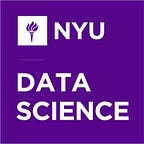CDS Assistant Professor Brian McFee Wins Steinhardt Teaching Excellence Award
Congratulations to CDS Assistant Professor of Music Technology and Data Science, Brian McFee, for recently receiving the 2021–2022 Steinhardt Teaching Excellence Award. The award is given to full-time faculty members in the Steinhardt School of Culture, Education, and Human Development who exemplify excellence in their teaching. Winners receive a specially designed certificate and a monetary award.
Brian joined CDS in 2014. His research focuses on developing machine learning tools for analyzing music and multimedia data. This includes recommender systems, image and audio analysis, similarity learning, cross-modal feature integration, and automatic annotation. We caught up with Brian to discuss a bit about his current teaching and research focuses.
Congratulations on receiving the Steinhardt Teaching Excellence Award. Can you discuss a bit about some of your teaching focuses from the current academic school year?
Thanks! I think we all understand that the past couple of years has been a tough time in general, but especially for students keeping up with classes. Much of my teaching efforts for the past year have gone toward redesigning courses to improve flexibility, and make it easier to accommodate students dealing with all the various and unpredictable difficulties that have arisen during the pandemic. Probably the biggest challenge has been finding the right balance between flexibility and maintaining engagement and something resembling a traditional classroom environment.
What has your research recently been focused on and how has that informed your teaching?
The two courses I primarily teach — Big Data in CDS and Digital Signals Theory in Music Technology — are introductory in nature, and draw students with highly diverse backgrounds and prior exposure to the topics covered. My research generally focuses on developing tools to analyze collections of audio, and there are of course some natural connections to both of these courses, whether it’s through Fourier analysis or information retrieval. While I don’t often go searching for ways to show off my own work in these classes, it is occasionally helpful to show examples of where the various topics being discussed show up in more advanced applications.
What are you excited to both research and teach in the coming academic year?
On the research end, I’m currently investigating several aspects of the audio representations learned by deep convolutional networks, how they compare to more traditionally engineered representations in terms of bias and interpretability. There is no shortage of questions to ask in this space right now, and these topics connect directly to many of the things we cover in both Big Data and Digital Signals Theory.
For more information on Brian’s teaching and research, please visit BrianMcFee.net.
By Ashley C. McDonald
